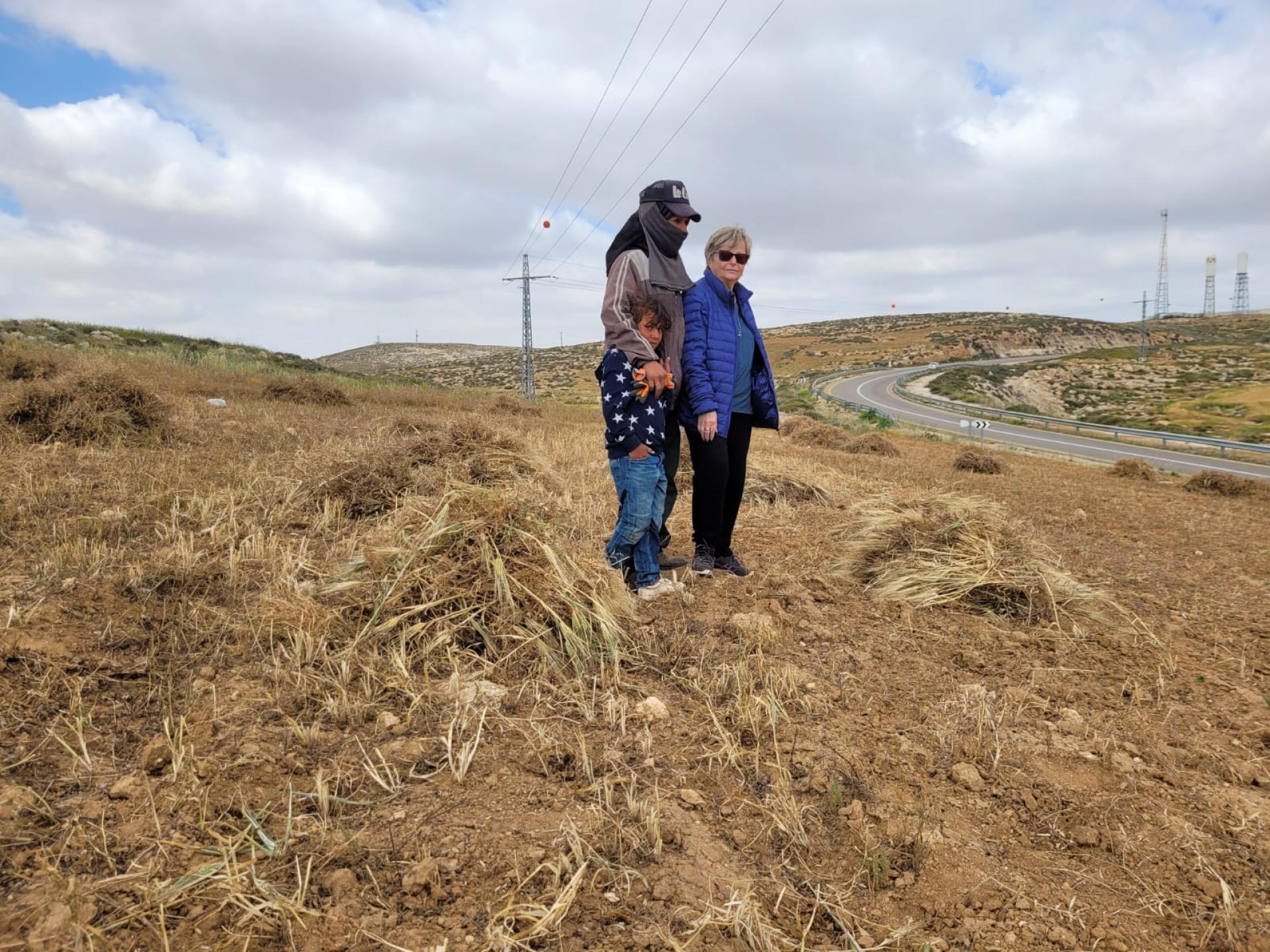A-Dirat – a continuous harassment of the Awwad family
Meitar crossing: the parking lots are full, on both sides.
Route 317:
Immediately after turning to the Meitar industrial area, we saw, on the side of the Upper Wadada, a white van with a very large Israeli flag flying on it. Further down the road we met Rada Abu-Awwad, from Upper Wadada, stacking barley she had harvested in the field, with her five-year-old daughter Dikar. She explained that the van with the flag belonged to the driver of the bugger who works in the field in front of their house. This is the area of Yinon from Havat (farm)-Meitarim, and the work is being done for the purpose of planting a vineyard. According to her, Yinon shows his presence around the area where they live, but does not bother them personally.
I asked her if they collect gorse (‘Akub) (in Arab cuisine, gorse is considered a special delicacy among wild plants. The heart of the plant, the stem and the flowering buds are carefully collected, cleaned of the thorns, and boiled or fried in a variety of ways). Rada says that this year they don't collect the gorse because of the settlers and the fine involved.
Rada asked the daughter to return to the tent, but the five-year-old did not agree to leave her mother alone (touching).
Susiya settlement: You can see three new houses which is in the beginning of the construction. The construction boom does not stop.
Carmel settlement: Here too, you can see the skeleton of a new house from the road.
Route 356:
The goal is to visit the village of Umm Lesafa, which is located west of the road, on the side of Yatta, south of the village of Khalet al-Miya. Opposite, on the eastern side of the road is the village of A-Dirat. Already about two months ago, we learned through the social networks, through the publication of the activist Itay Feitelson, about the regular harassment of the Sa’id Elian-Awwad family. On Saturday, the daughter of the family, Kamar, was injured by a soldier who kicked her. I wanted to hear the details first hand. Sa’id went to look for a job and we were greeted by his wife Rima.
She said that the family's agricultural lands, about 280 dunams, are far from Umm Lesafa - located near Mitzpe Yair, in front of Susiya (officially Mitzpe Yair is a neighbourhood of the Susiya settlement, but in practice it is run as a separate settlement). From these territories they suffer repeated harassment. A year ago, they planted olive trees there, and the settlers uprooted them all.
Every Saturday they travel to their territory, even though they are unable to cultivate it, because of the harassment. They usually arrive with the extended family, sometimes in more than one vehicle, arranging themselves in the area to show their presence. But usually, the settlers report their arrival to the army which then comes, sets up barriers and closes the area: a kind of routine visit to their lands.
She emphasized the idea of confirming the attachment - the Zumud to the ground.
I asked her to hear the details of the case in which the daughter, Qamar, eleven years old, was injured. According to her, one of the border police ran after the children to drive them out of the area. Qamar asked the soldier, "Why are you evicting us? This is our land." Then, a violent police officer kicked her in the leg, she was injured and had to lie down at home and recover. The day before our visit, on Shabbat, thirteen family members visited their land. According to her, about fifty security personnel arrived: army, police and the border police.
A lawyer named Salim, is dealing with this for them, trying to obtain permits for their lands.
As usual, this is so hard to hear.

